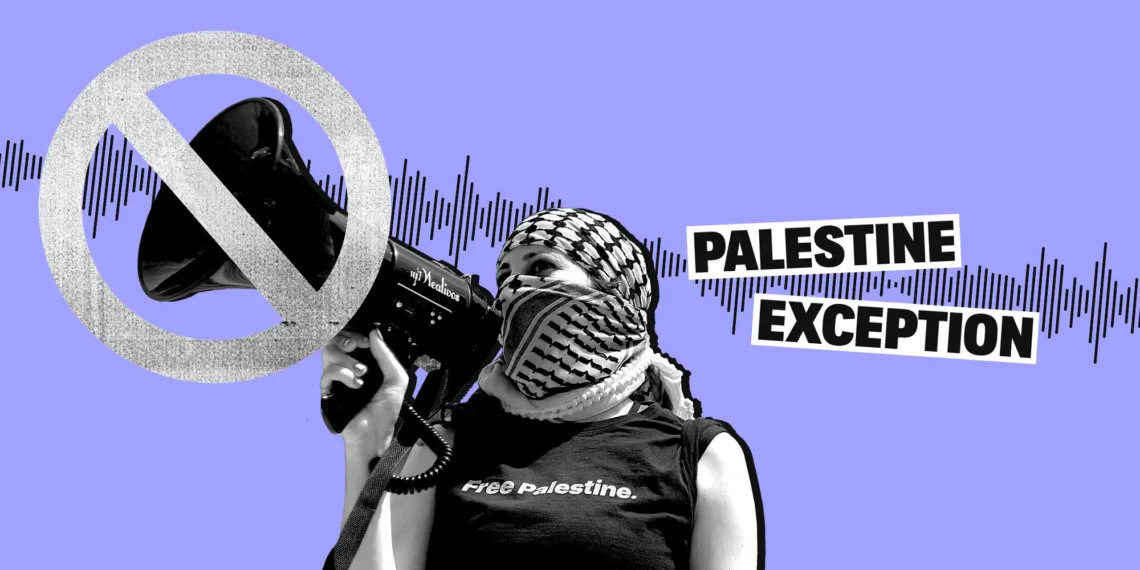The “Palestine Exception”: How College Crackdowns on Protests are Silencing Free Speech
In recent years, college campuses across the United States have become a battleground for the Israeli-Palestinian conflict. Students, faculty, and community members have been organizing and participating in protests, rallies, and other forms of activism to raise awareness and show solidarity with the Palestinian people. However, these peaceful demonstrations have been met with harsh crackdowns and censorship from university administrations, leading to what has been dubbed the “Palestine Exception” – a disturbing trend that threatens the very foundations of free speech on college campuses.
The Intercept Briefing, a podcast hosted by journalist Glenn Greenwald, recently delved into this issue, shedding light on the growing number of incidents where universities are punishing students for expressing their support for Palestine. From disciplinary actions to threats of expulsion, these crackdowns have had a chilling effect on free speech and have raised concerns about the state of academic freedom in our institutions of higher education.
One of the most alarming cases discussed on the podcast was that of the University of Michigan, where a group of students were facing disciplinary action for a peaceful sit-in protest against a visit by Israeli soldiers. The students were accused of disrupting university activities and were threatened with suspension and even expulsion. This heavy-handed response from the university not only violates the students’ right to free speech but also sends a dangerous message that any form of dissent or protest will not be tolerated.
But the University of Michigan is not an isolated case. Similar incidents have been reported at other universities, including the University of California, Berkeley and New York University. In some cases, students have been arrested and charged with criminal offenses for participating in peaceful protests. These actions by university administrations not only stifle free speech but also create a hostile environment for students who are trying to exercise their democratic right to express their opinions and beliefs.
So why is there a “Palestine Exception” when it comes to free speech on college campuses? The answer lies in the influence of pro-Israel groups and donors who have been exerting pressure on universities to silence any criticism of Israel. These groups have been using tactics such as filing complaints with university administrations and threatening to withhold donations to bully universities into taking action against students and faculty who support Palestine. This interference in academic freedom is deeply concerning and goes against the very principles of higher education.
Furthermore, these crackdowns on Palestine solidarity protests also have a chilling effect on other forms of activism and free speech on college campuses. Students may become hesitant to express their views on other controversial issues, fearing similar repercussions from university administrations. This not only limits the diversity of opinions and discourse on campus but also goes against the very purpose of higher education – to encourage critical thinking and open dialogue.
As the discussion on The Intercept Briefing highlighted, the “Palestine Exception” is not just a threat to free speech but also a violation of human rights. The Palestinian people have been living under occupation and facing human rights violations for decades, and it is the responsibility of universities to provide a platform for students to express their solidarity and raise awareness about this issue. By silencing these voices, universities are complicit in perpetuating the oppression of the Palestinian people.
It is also worth noting that these crackdowns are not limited to just protests and demonstrations. Students and faculty who have spoken out about the Israeli-Palestinian conflict have faced backlash and intimidation from pro-Israel groups and individuals. This not only creates a hostile environment for those who dare to speak out but also undermines the principles of academic freedom and intellectual diversity.
In conclusion, the “Palestine Exception” is a dangerous trend that threatens the very essence of free speech and academic freedom on college campuses. It is imperative that universities uphold their commitment to providing a safe and open space for students to express their opinions and engage in activism. The silencing of Palestine solidarity protests and the intimidation of students and faculty must end, and universities must take a stand for the principles of free speech and human rights. As students and members of the academic community, it is our responsibility to speak out against these injustices and demand that our universities uphold their values of inclusivity, diversity, and freedom of expression.






